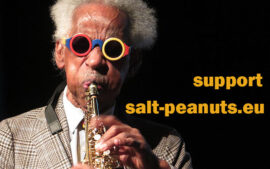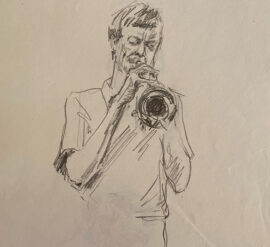On 26 June 2014, we published the first article in our brand new online magazine salt peanuts*. On the occasion of the 10th anniversary of this inauguration of the magazine, on 26 June 2024, we publish this reflection on the rationale for the journal and where we are after ten years of extensive work. Under a great photo of a smiling Lotte Anker, taken by editor Jan Granlie at Umeå Jazz Festival in 2012, we declared that «This year’s Kongsberg jazz festival starts on Wednesday 2. July. The new Nordic website salt-peanuts.eu will be there with daily reports and reviews throughout the festival. As early as Thursday July 3, we will be out with the first daily report, which i.a. will contain a review of Christian Wallumrød’s commissioned piece with the Trondheim Jazz Orchestra».
Since then, we have developed the journal to become a leading medium for discussing what we called «improvised and other strong music», our chosen slogan for the journal. Since the start, we have published over 8,500 articles, or an average of almost 3.5 articles per year. weekday. We are regularly read by up to 10,000 unique and individual, physical readers each month. Several of our regular readers have salt peanuts* as an integrated part of their morning or evening rituals.
The financial framework and social willingness to pay
After editor Jan Granlie was dismissed, in breach of contracts and labour regulations, from the Norwegian Jazznytt, he and Johan Hauknes, who had also been an active contributor to Jazznytt, took the initiative to establish salt peanuts*. The aim was to create an online magazine for jazz and other strong music, and salt peanuts* became a reality. In all these years, we have placed great emphasis on following international jazz, with the main emphasis on jazz music and musicians, on jazz life, in Norway, Sweden and Denmark.
In these ten years, it has mostly been the same idealists who have written about jazz music in the journal. From day one, the magazine has aimed to inform, create understanding and provide insight into the art form ‘improvised music’. This is a familiar and understood description among our readership. The brand of salt peanuts* is well known and highly recognized by our many international readers and they have a deep understanding of the background for the editorial content. Initially, the idea was to form a joint-stock company that would take the ideas of Granlie and Hauknes onwards, to organize and run a high quality online journal mainly for jazz. salt peanuts* should develop into an important journal for improvised music. But the idea of a joint-stock company has not yet become a reality for financial and other resource-related reasons.
Until we can realize this, and purely for practical reasons, the journal is run as a department in a sole proprietorship of one of the initiators. All attempts to establish initial capital for the new company have failed. A campaign to call for financial contributions from readers has only resulted in smaller amounts. Persistent attempts to obtain substantial operating support from the Cultural Council and other public sources for grants have failed. Our attempts to attract advertising from jazz festivals, jazz clubs, record companies and other organizations in the jazz scene have been unsuccessful. But with a considerable personal effort, the initiators and other supporters have nevertheless developed the journal to become the leading medium for systematic and broad coverage of Scandinavian and international jazz.
A critical and understanding public audience on jazz is a prerequisite
From the beginning, it was important to us that salt peanuts* should be an independent medium, both editorially independent and financially independent of actors within the jazz world.
During the last 30 years, Norwegian and Scandinavian music life has been in continuous growth and development. Within all genres and types of organization, the number of musicians has increased. With this growth, public subsidies to the field have also increased. As a result, the quality and breadth of Scandinavian music, and the international attention surrounding it, has never been higher than today. In the Scandinavian countries, we are today in the middle of a musical golden age for jazz, contemporary music and other improvised music, the likes of which we have never seen before. In this field of art and culture, independent voices of critical review, educative information and the long term nurturing of a critical public are more needed than ever before.
Just a few years years ago, the large, national jazz festivals had 50-100 press-accredited journalists and photographers, and the national daily newspapers and broadcast media carried daily reports from the festivals. Through many decades, NRK documented key parts of Norwegian jazz history through its participation and production of jazz concerts. There was once a fight over some 1-200 press seats at Norwegian jazz festivals. This is no longer the case. Today, only a few local and regional newspapers (often the local newpaper) ahs been present at the jazz festivals – over the last ten years, often in the sole company of salt peanuts*. To the extent that the festivals set aside press spaces anymore, there is little or no demand. Documenting Norwegian jazz history from the 1960s and the 1970s, even the 1980s, is fairly easy, the archives of most national media provides information and documentation. After 1990 even the coverage of NRK — the national public service broadcaster — is scarce. Where should one look, 25 years from now, for documentation of Norwegian jazz history during the decades after 2000? The established national media will not be able to provide the answers.
It is a public task to ensure and maintain public awareness of all arts, including art music, and artists who maintain a very high international level, and who have again and again shown the ability to renew themselves and spread out into completely new expressions. All actors no the Norwegian jazz scene are also critically dependent on a knowledgable and wide public awareness. Without this, the jazz life’s long-term carrying capacity and drivers for development will disappear. When national media with a public service purpose, both newspapers and NRK, neglects art music with an argument that «it is narrow and not of interest to the general public», they are ineluctably cutting down the tree, as well as the branches of it, on which all music lives and thrives. Without publicity and publicity, the description of the music as narrow becomes a self-fulfilling prophecy.
Everything is connected to everything
Of course, salt peanuts* cannot make up for this entire drop in attention, but for us and for salt peanuts*, it has been important that there is a national, knowledgable and critical audience of improvised art music. For us, it has been important, almost as a social obligation, to be involved in ensuring such publicity about a musical expression that has given us all so much. As a bare minimum, we have prioritized maintaining and strengthening critical, knowledge-based, creative and insightful concert reviews, music reviews and music reports. «If a festival or a club is to survive, it is dependent on the events being talked about, both beforehand, during and after the events. If the potential audience have no experience in listening to and no knowledge of new, contemporary music, the music will eventually die. And we believe that all links, from musicians, organizers and the audience, are all dependent on each other to make the total ‘food chain’ work together», concludes editor Jan Granlie.
Therefore, throughout these ten years, and against all reason, we have used large amounts of our own resources to make a contribution to this social mission, without the cultural authorities or actors of the organized jazz life supporting the effort.
Publicity about jazz is a necessary part of making jazz music viable. It is important for jazz festivals, jazz clubs, record releases, and for the music and the musicians. Because we have had to cover the costs of our coverage of jazz concerts and jazz festivals privately, we have to prioritize strongly what we can cover, to what extent and how. «Because we are passionate about the importance of spreading and building social understanding of the importance of art music, we have almost sacrificed ‘house and home’ to write articles, daily reports, reviews and news about life around jazz and strong music. It simply cannot continue like this,» adds the editor.
Strong music requires strong independence
salt peanuts* does not only write about jazz. salt peanuts* is open for writings on all forms of music. The editorial board allows the individual writer to interpret the term «strong music» in their own way, so that on the website, in addition to articles on jazz, you can also find entries on contemporary music, folk music, rock and other forms of musical expression. The assessment of what deserve a place in the journal, is up to the individual author and his or her’s competence. «For improvised and other art music, public publicity and familiarity is necessary,» says director Johan Hauknes. «Without this, statements that such art music has a small and narrow audience, become self-fulfilling prophecies».
There is a long line of world-renowned and highly respected Norwegian and Scandinavian jazz musicians who are today virtually unknown to the general public in Scandinavia, while the same audience know all there is to know about the boyfriends of Taylor Swift, and the favourites of the Eurovision Song Contest. Their music not only influences the development of new music on a broad front, but these musicians are also widely used and necessary as studio musicians in most other music production, perhaps not least in popular music.
As important as this, is having an independent channel that can fearlessly and with insight comment on both musical, cultural and political aspects in a rapidly changing area of international music. salt peanuts* is not a member or owned by any of the umbrella organizations or organizers in the music field. This has meant that the journal can also comment on sensitive issues within the field, including jazz festivals, in an independent way. When in individual cases, we have accepted to receive support from festivals for travel and accommodation, it has been an emergency solution. We are painfully aware that our readers may therefore consider us partial to the interests of the festival or concert arranger, but it has been necessary for our coverage not becoming too great a private financial burden.
salt peanuts* has been online only since its inception ten years ago. We constantly research and debate about reading and medium/platforms. Reading online shows in many contexts to weaken concentration. This does not mean that adult, dedicated readers cannot, to their full advantage, read long articles online. One of the experiences that surprised many internet publishers the most was the popularity of the articles under the vignettes «The Long Read» in the British newspaper The Guardian. It is important for us to learn from the best in the field of communication and dissemination. In the journal, we are constantly looking at new areas of development, podcasts, which we have just covered, historical film clips from our near and distant jazz history.
Who, what, where and why
salt peanuts* has a non-discriminatory publishing practice, that is to say that all types of journalism basically receive the same amount of attention. Be it anything from short news reports to long festival reports, where the writers bring in material areas that go well beyond the event itself. And there should be room for it all in salt peanuts*. You should be able to find short daily reports, news and record reviews, but you should also have the opportunity to learn about improvised music, the history of improvised music, as well as other subjects related to the place, the surroundings or the history surrounding the event itself.
For many years, we have sought to be able to provide a systematic coverage of jazz also outside the outermost ring road around central Oslo, Ring 3. We have made countless attempts to find writers and other contributors from important places in Norway such as Bergen, Trondheim, Bodø, Kristiansand, Tromsø and Stavanger.
Without a financial basis and income, it has not been possible to succeed so far. From the inception in 2014, we have sought to direct salt peanuts* towards a Scandinavian and international audience. It also requires that we have writers from different countries and places. At the start we had employees in the capitals in Norway, Sweden and Denmark. But since we don’t have the financial resources to pay someone for the work they do, some people drop out, often without others coming along.
At the tenth anniversary, the journal has contributors in Oslo, at Voss, in Copenhagen and in Israel. In addition, we are active members in Europe Jazz Media (EJM), an organization that consists of the best European jazz magazines in Europe. Key contributors to salt peanuts* were leading entrepreneurs of EJM when it was initiated. Each month, the EJM network publishes an overview of which record releases readers should check out, selected by the individual journal editors. This is an organization that has grown significantly in recent years, and which will be developed further, to include a number of common European measures in the future.
Will there be a huge celebration?
The staff at salt peanuts* don’t really like to celebrate themselves. Rather, we strongly prefer to use any resources on editorial development and wider coverage of improvised art music. We have no sources of income and public support is virtually non-existent. After ten years with the magazine, where we have often experienced that we are the only national medium that has discussed and evaluated key festivals and concerts in Norwegian jazz, we cannot afford this any longer. We salt peanuts* have used more than one million Norwegian kroner of our own private funds, to finance the operation and editorial development of salt peanuts* and to cover Norwegian and Scandinavian jazz.
Over the course of ten years, we have provided free work to the jazz audience, the jazz scene, festivals, concert organizers and other jazz organizations, which, with the Norwegian Union of Journalists recommended minimal fees for freelance work, would correspond to a double-digit number of times this amount. But if we had free financial resources to do so, we would have liked to have marked the tenth anniversary at this year’s Kongsberg Jazz Festival. «Unfortunately, we have neither the time nor the money for that,» says editor Granlie.
«We use our time to keep up to date with concerts, festivals and other events and keep up with all the record releases that are coming, to give readers information and opinions about what is happening. We want to continue with this, even if we cannot promise the same high level of activity in the future, as we have had in the first ten years of the journal’s life», concludes Granlie.
salt peanuts*




































